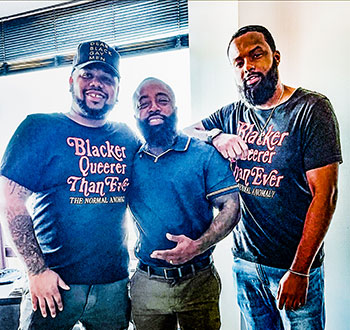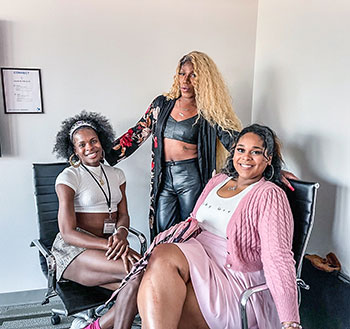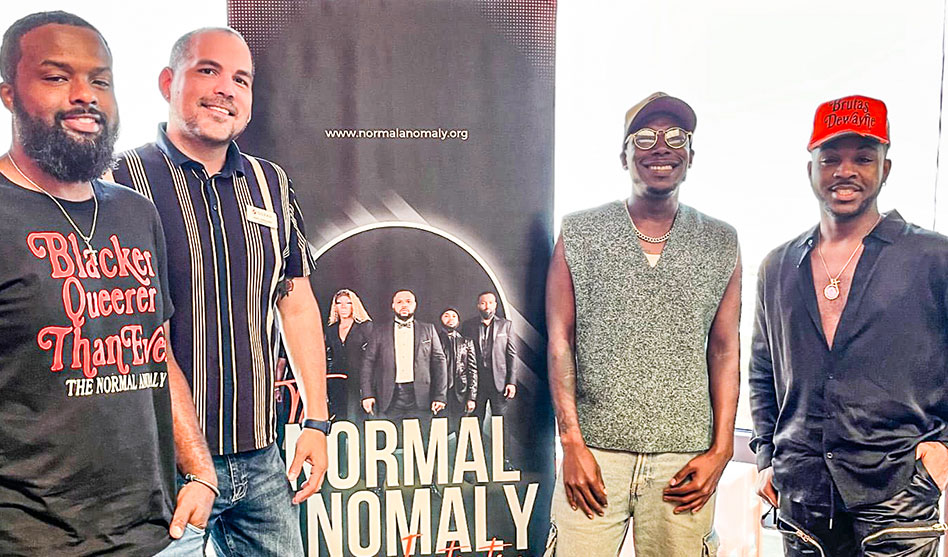Jordan J. Edwards, left, is program director for The Normal Anomaly Initiative. He is pictured with Joey Berglund and Normal Anomaly peer liaisons Joey Jackson-Streeter and Brutas Dewayne at the opening of Normal Anomaly’s Dallas offices.
Houston-based Normal Anomaly opens offices in Dallas during Pride Month
CAROLINE SAVOIE | Contributing Writer
CarolineLSavoie@gmail.com
A sign hangs in Jordan Edwards’s home, reminding him of his purpose: “Everyone you meet is fighting a battle you know nothing about,” it reads. “Be kind always.”
“I live by that,” Edwards said. In his role as program director for The Normal Anomaly Initiative, a Houston-based nonprofit for Black LGBTQ communities, the sexually-fluid Houston native serves the Black queer community by increasing opportunities for sustainable employment and linking people to care services for those living with HIV and those interested in PrEP.
Normal Anomaly celebrated its expansion to Dallas with a new business location’s grand opening on Wednesday, June 12. Edwards said Normal Anomaly wanted to expand to Dallas to serve its ever-growing Black queer population, especially when the legislature in Texas is putting pressure on the LGBTQ community.

The Normal Anomaly Initiative Founder Ian L. Haddock with Twan McGray and Program Director Jordan J. Edwards
Joey Jackson-Streeter, a Normal Anomaly peer support liaison, said working in Dallas is crucial.
“It’s a thriving community in need of strengthened support and a stronger sense of unity. I’m enthusiastic about this opportunity because there’s enormous potential waiting to be unleashed and nurtured,” he said.
Brutas Dewayne, another liaison, said he’s “elated” to do this work because growing up as a Black gay man in his early adulthood, resources were limited.
“Then I begin to see more visible representations of what looked like me,” he said. “I’m so happy to be that help that I often call saving grace [because] it gave me a second chance and a new outlook on life. I am super proud to give my loyalty, dedication and time to this amazing work.”
Edwards said the nonprofit’s peer support program aims to tackle HIV prevention and treatment barriers distinctly affecting the Black and queer community. He said it also plans to help people with financial literacy and mental health resources.
The peer support program is a research study under the HIV Prevention Trials Network, and it’s meant to build equity through advocacy.
“We’re going to address the barriers to HIV prevention for Black same-gender-loving men, allowing the community to have representation and receive support from peers in a safe, brave space,”
Edwards said. “People can come to us to talk, share their feelings, ask for advice, receive education on HIV testing, PrEP, DoxyPEP and mental and financial help.
“Wherever they are, however they may be struggling through their journey — we want to help.”
Edwards said the benefit of a peer support model of care allows members of the Black queer community to trust those they’re getting information from. “We always feel more comfortable talking to someone who represents us,” he said.
Connecting with the community will take place in the form of pop-ups near clubs during after-work hours to better serve the working population. There will also be three people staffing at the Normal Anomaly office in Deep Ellum, a site that Edwards said offers a safe, brave space.
At the grand opening, Edwards said the spectrum of the LGBTQ community showed out, voicing that they’ve been waiting for a new space to come and be. “While the research study is focused on Black same-gender-loving men, Normal Anomaly is focused on the entire spectrum of the community it serves,” he said.

Among those attending the grand opening of The Normal Anomaly Initiative’s Dallas offices were, from left, Hernomi Imon Houston, Joelle Espeut and Míchél Loren.
Normal Anomaly started as a blog in 2016 to tell the stories of people in marginalized communities. Over three years, Founder Ian L. Haddock grew the platform to work with the United States Conference on HIV/AIDS and put together a team of “nontraditional activists.”
Based on concepts like healing justice, harm reduction and restorative justice, the group became an organization focused on telling stories of Black queer people in 2019. Through 2020, the group shifted its focus to changing Black queer stories through advocacy, direct services and technical assistance.
In 2021, Houston-based programs including the Positives Organizing, Wellness and Resilience (POWR) Project, Transgender Allyship Collective (TAC), Project Liberate and Black Queer Plus: Center for Liberation were born. Edwards said he hopes to expand these programs to Dallas in the future.
Normal Anomaly is responsible for facilitating 520 HIV tests, employing 73 people and educating 296 people on sexual health. “Touching their population through learning cohorts, development initiatives, HIV Testing, employment linkage, transportation, a thrift story and more, The Normal Anomaly Initiative is ‘Eliminating Barriers and Creating New Norms’,” according to the group’s website.
Edwards said his first experience with HIV was when he watched a family member pass away of AIDS complications in early 2000. But the shift in his life changed once he got his HIV positive results in 2013. He said when he got the news, it was a traumatic experience delivered with a callousness he did not want to see replicated.
So he approaches his line of work with a caring, kind disposition: “I vowed to make sure I’d show them love and care,” he said.
When it comes to working with other community services in Dallas, Edwards said Normal Anomaly is “not coming in to take up space but, instead, coming in to make space.”
“From bartenders to drag performers to mothers and fathers with gay children, we’re trying to reach unconventional communities and connect them with resources to make their lives easier,” he said.
Through working with community leaders and organizations like United Black Element and Abounding Prosperity, both of which serve the same communities as Normal Anomaly, Edwards said his goal is to build trust and connect with leaders and care providers to help individuals gain confidence in handling their care.
“We want people to become self-sufficient in building their care plan, and we’re going to do that by being connected in the community and providing honest, real advice,” he said. “We want to know the people working at the places we refer people to. We want to know the timelines for care. We want to reach back out to people and ensure they’re being taken care of. We want to build personal relationships.”
Edwards said the nonprofit is hoping to expand and grow in Dallas just as much as it has in Houston. “We’re here to bring the community hope, brave spaces, care, and, of course, joy,” he said.
The Normal Anomaly office is located at 1910 Pacific Ave., Ste. 17213 in Dallas. For information email info@normalanomaly.org or visit NormalAnomaly.org.

